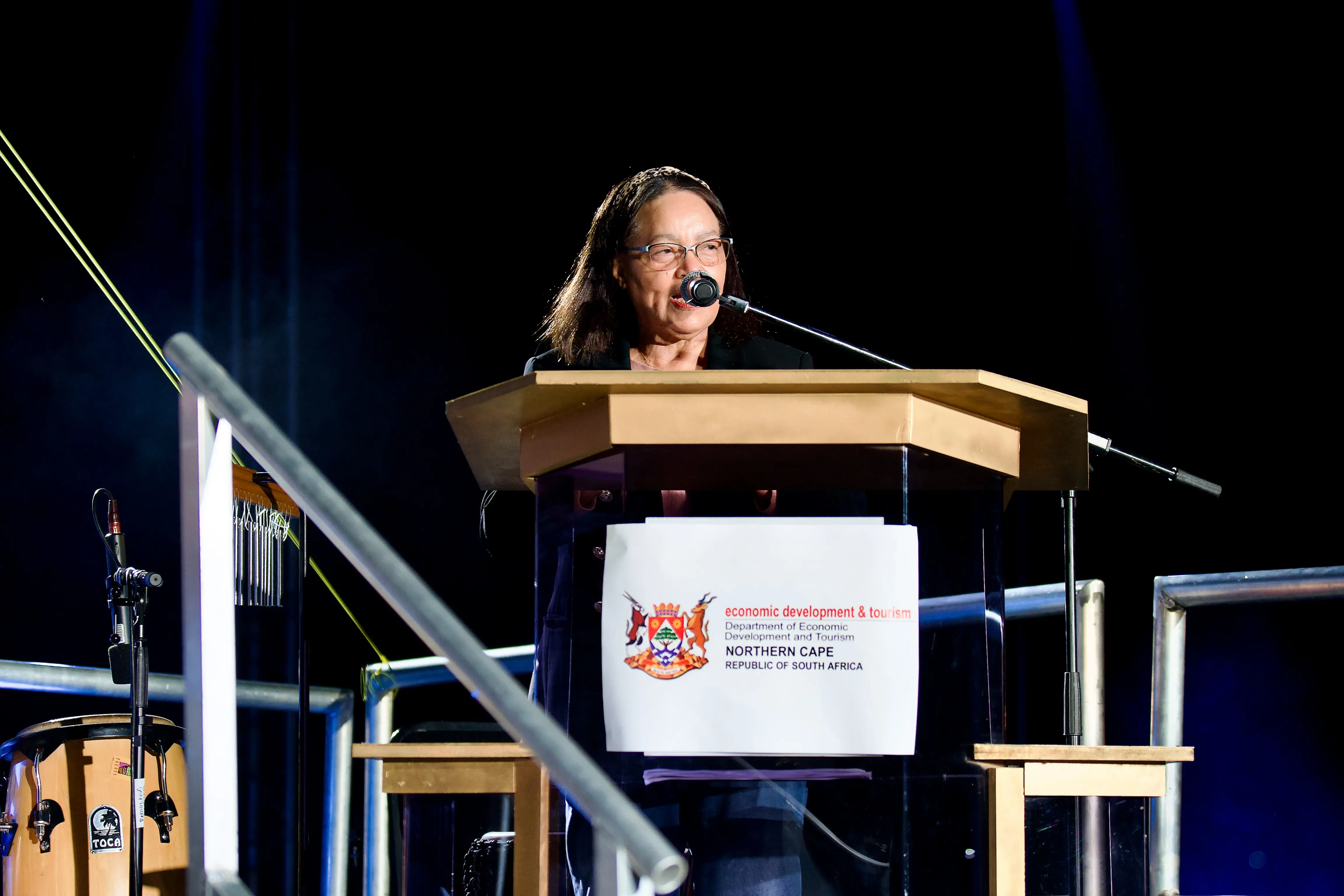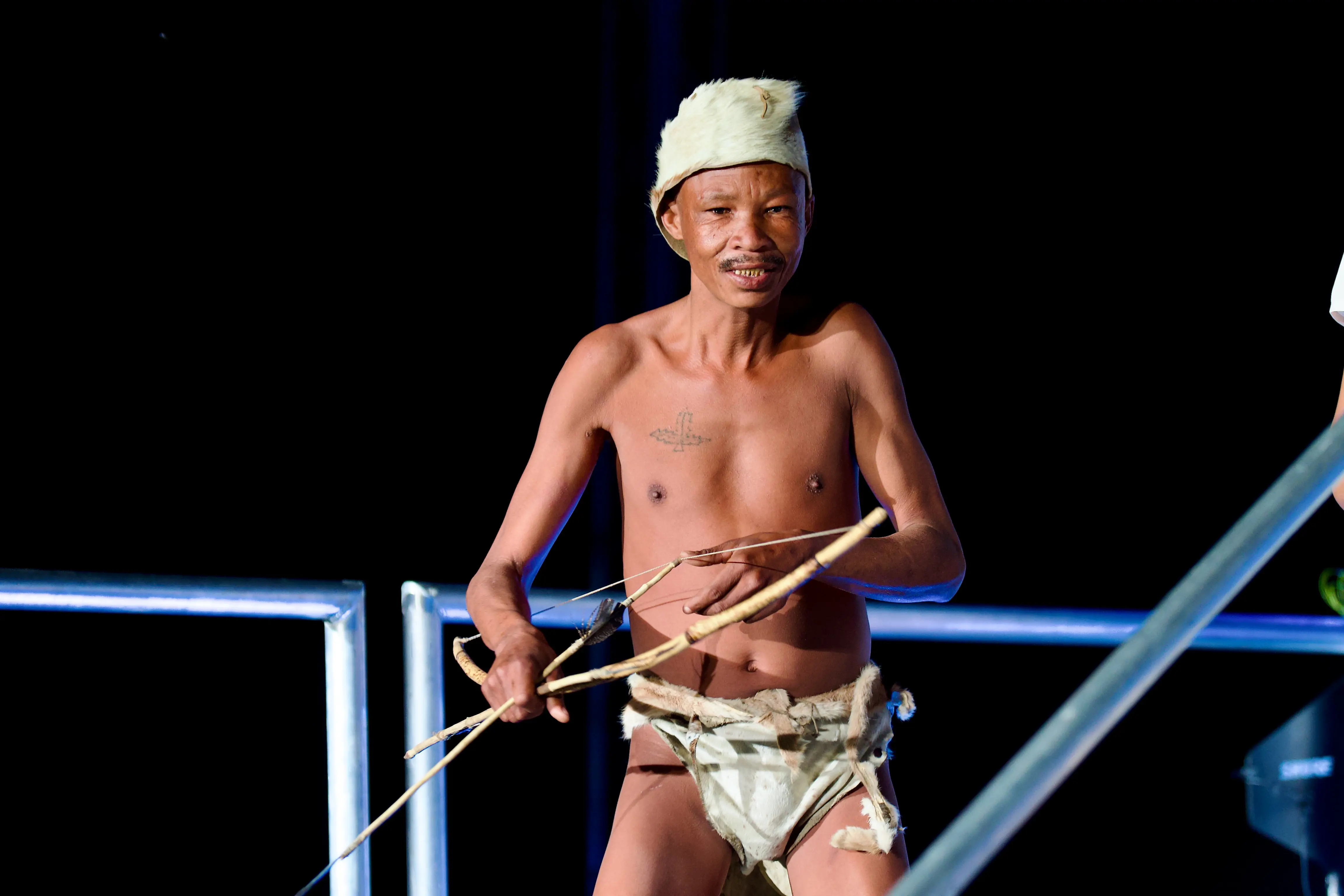Govt sets sights on Northern Cape's skies in bid to boost SA's astro-tourism sector
Renowned for its breathtaking landscapes and having some of the darkest skies in South Africa, the province is perfectly positioned as a top-tier destination for stargazing and astro-tourism.

A representative of the Square Kilometre Array (SKA) Radio Telescope in the Northern Cape takes media on a tour of facilities, 26 September 2024. Picture: Katlego Jiyane/Eyewitness News
SPONSORED BY SA TOURISM
CARNARVON - All eyes were firmly set on the Northern Cape province this past weekend, as the country marked World Tourism Day.
The province was abuzz with dozens of dignitaries and officials descending on the province to celebrate the region's rich heritage and hidden treasures that have captivated the hearts of tourists and residents alike.
Renowned for its breathtaking landscapes and having some of the darkest skies in South Africa, the Northern Cape is perfectly positioned as a top-tier destination for stargazing and astro-tourism.
ALSO READ:
- Sho't Left Travel Week campaign: North West province shows off with ancient mountains, sky safaris
- Sho't Left Travel Week campaign: Explore on a budget in the North West
Astro-tourism is fast becoming a global trend that encourages visitors to minimise their environmental footprint, and with this in mind, South Africa is poised to become the leading country in providing astro-tourism opportunities.
Eyewitness News was given a tour of the Square Kilometre Array (SKA) Radio Telescope, and how it is designed to advance our understanding of the universe by allowing a clear view of our galaxy, the Milky Way.

Picture: Katlego Jiyane/Eyewitness News

The MeerKAT 64-antenna radio telescope in the Northern Cape. Picture: Supplied/Anton Binneman/SARAO SKA

MeerKAT's 64 dishes or antennas provide 2,000 unique antenna pairs, far more than any comparable telescope. Picture: Supplied/Anton Binneman/SARAO SKA
The Northern Cape is set to become the hub of this type of tourism in South Africa. Not only is it appealing to visitors, but it will also assist in alleviating poverty in the area.
The province's mining and tourism sectors provide significant sources of employment. However, unemployment rates in the region remain high, reminiscent of broader national trends.
In a bid to correct the situation, the Tourism Department, in conjunction with the Department of Science, Technology and Innovation, say that the focus on sustainable tourism, such as astro-tourism, will bring in the necessary revenue to help improve economic circumstances in the region.
The astro-tourism strategy, which has been presented to and approved by Cabinet, is now out for public comment, and the Tourism Department hopes it will improve employability in the province.
"We invite the public, including the tourism and astronomy stakeholders, to participate and contribute towards strengthening this very important work by submitting their comments," said Tourism Minister Patricia De Lille, who confirmed the strategy was gazetted and the gazetting notice published on Friday, on World Tourism Day.

Tourism Minister Patricia de Lille in the Northern Cape, 26 September 2024. Picture: Katlego Jiyane/Eyewitness News
The minister spoke positively about South Africa's stance on leveraging small towns like Carnarvon, with a small population and low pollution levels, to draw in tourists.
De Lille said the focus on domestic tourism was strong, and played a crucial role in sustaining the industry. She reported that 38 million domestic trips were embarked on last year alone, which injected more than R120 billion into the economy.
ASTRO GUIDES LEAD THE CHARGE
Through this project, six astro guides have so far been trained to show tourists the night skies, and to narrate stories of their forefathers' astronomy beliefs.
" .... In a faraway land at the bottom of the African continent lived a bushman girl, and this girl used to sit at a fire at night and wonder how the huntsmen are going to find their way home. One night, she decided to take the ashes and coals from the fire and threw them up into the sky, creating the Milky Way galaxy, and the red and white stars we see. Till this day, we use the Milky Way galaxy and the stars to find our way home," said Amy Lee Visagie, one of the guides trained to advocate for astro-tourism, not only in the province, but in the country as well.
Visagie said she had a difficult time being admitted to any university, but as she was about to give up on following her dreams, she received an opportunity that would change her life.
As an advocate for astro-tourism, she said the stories relayed by her forefathers needed to be told.
"I think the most important part about astro-tourism is keeping our culture and heritage alive, because throughout my astro experience, we offer the indigenous stories the San people told for thousands of years. These are stories that we grew up with, and I think it's important to keep those stories alive. Since we are one of the oldest existing races of people, I think it's important to keep those stories alive," explained Visagie.

Advocating for astro-tourism goes beyond economic benefits; it is a way to keep ancient stories told by the San people alive. Picture: Katlego Jiyane/Eyewitness News
Residents who support the strategy say if done right, this type of tourism could be a catalyst to developing the Karoo, and providing tangible opportunities for rural tourism to further develop rural areas.

Carnarvon residents dance at the launch of the Department of Tourism's astro-tourism strategy launch in the Northern Cape, 26 September 2024. Picture: Katlego Jiyane/Eyewitness News
A HIDDEN GEM
De Lille said this year's Tourism Month celebrations provided the perfect opportunity to celebrate the sector’s significant contribution to global development, cultural exchange, people connection, and the exploration of the many vast places found in South Africa.
She said the Northern Cape was deliberately chosen to host these celebrations because it remained one of the country’s hidden gems.
"That is why we chose to have this celebration in the Northern Cape because it is one of the lesser visited provinces, and we need to change that because this is a beautiful part of our country," said De Lille on Friday at Carnarvon Primary School.
If successful, the vision of the Department of Tourism, as well as the Science, Technology and Innovation Department will yield sustainable opportunities, making the Northern Cape a global leader in both astro-tourism and eco-friendly travel.
The national astro-tourism strategy is out for public comment until 27 October. Those interested in submitting written inputs can do so in the following ways:
- Mail the Director-General of the Department of Tourism at Private Bag x424, Pretoria, 0001 ( Attention: Dr Laeticia Jacobs);
- Deliver submissions by hand to Tourism House, 17 Trevenna Street, Sunnyside, Pretoria, 0001; or
- Email submissions to astrotourism@tourism.gov.za